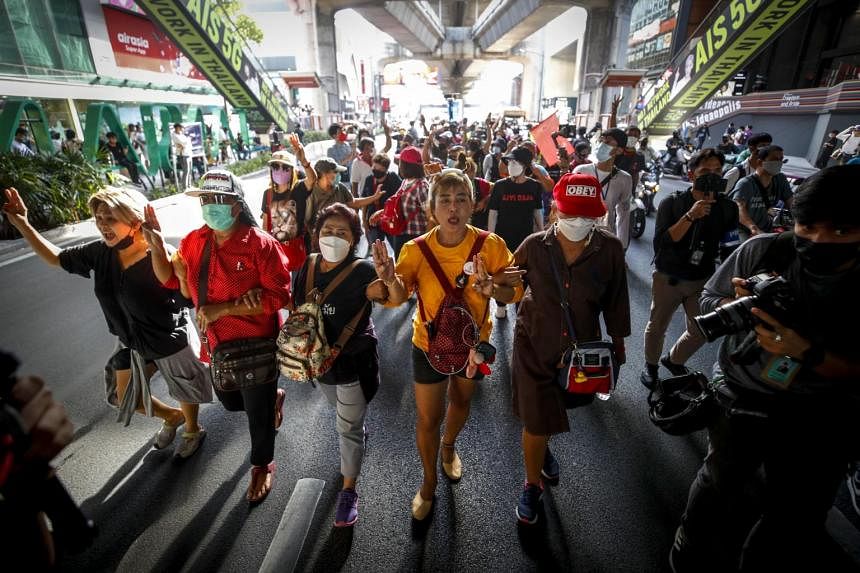BANGKOK - For the first time, the Bangkok authorities have drawn out designated protest sites for demonstrations in the capital, following fresh anti-government rallies taking place in recent weeks.
"There is a need to clearly designate areas for public demonstrations so they can be peaceful and not affect national stability and public safety," said the order signed by the city's new governor Chadchart Sittipunt.
The seven locations across the capital include the Lan Khon Mueang Town Square in the Phra Nakhon district and the Bangkok Youth Centre in Din Daeng. These two locations are near the Democracy Monument and Victory Monument respectively, which are popular sites for protesters to gather.
The other sites, which include open spaces, sports stadiums and a park, are located farther out from central Bangkok.
With Thailand relaxing its Covid-19 measures and set to move into its "post-pandemic" phase from Friday (July 1), demonstrations have returned to the streets after several months of hiatus.
Earlier this month, anti-government protesters marched from the Democracy Monument to the Victory Monument in central Bangkok, reigniting demands for Thai Prime Minister Prayut Chan-o-cha's resignation.
The protest, however, spread to other parts of the city, resulting in clashes at the Din Daeng intersection where protesters hurled firecrackers and projectiles at the police.
Last week, protest groups Ratsadon, We Volunteer (WeVo) and Thalu Fah also held a rally commemorating the June 24, 1932 revolution that changed Thailand from an absolute to a constitutional monarchy. The gathering, which involved a short march, live performances and art exhibitions, was peaceful.
With fresh demonstrations re-emerging, Mr Chadchart said last Friday that providing such sites will ensure public safety and ease disruptions to businesses and traffic, while allowing groups to demonstrate peacefully.
"We believe if we provide specific places for demonstrations, people will not take to the streets and block traffic. Mobile toilets will be provided and CCTV cameras are also in place to ensure security," he told local media.
Reserving spaces for public protests was one of Mr Chadchart's campaign platforms in the governor election, which he won in a landslide victory in late May.
Rally organisers will have to seek permission to use the designated sites at least 24 hours in advance and follow rules under the Public Assembly Act, including ensuring that state-owned property is not damaged.
Mr Rattapoom Lertpaijit, 26, a spokesman for WeVo, a group of volunteers in charge of protest security, thinks rally organisers will be keen to use the seven sites as this could make the gatherings safer.
"We see them as safe spots where there is less risk of us facing criminal charges or violence breaking out since they are set aside for protests," he said, adding that he hopes the number of sites can be expanded in future.
With national elections set to take place by early next year, political tensions have been rising and Mr Rattapoom expects more rallies in the months to come.
He also thinks permission to hold protests at these locations may now be granted more readily. Before this, rally organisers were still required to seek permission from the city to hold protests but their applications were often denied, he said. "We would still go on with the protest, but this meant that the authorities had more reasons to arrest us as they could say that our protest was illegal."
While the move gives protesters spaces to gather, Chulalongkorn University political scientist Pitch Pongsawat said it does not absolve them from potential charges related to anti-government speeches or activities that take place during the rallies.
Thailand remains under an emergency decree enacted in March 2020, which grants the government broad powers to enforce laws to contain the spread of Covid-19. Emergency rule is scheduled to expire at the end of July but has been extended multiple times in the past two years.
Among its various measures, the decree bans public gatherings and has been used against anti-government protesters in recent years.
In a Bangkok Post report, Mr Chadchart said the city's new order will allow demonstrations to proceed under the emergency decree, and that protesters can still hold gatherings outside of the seven sites, subject to existing laws.


